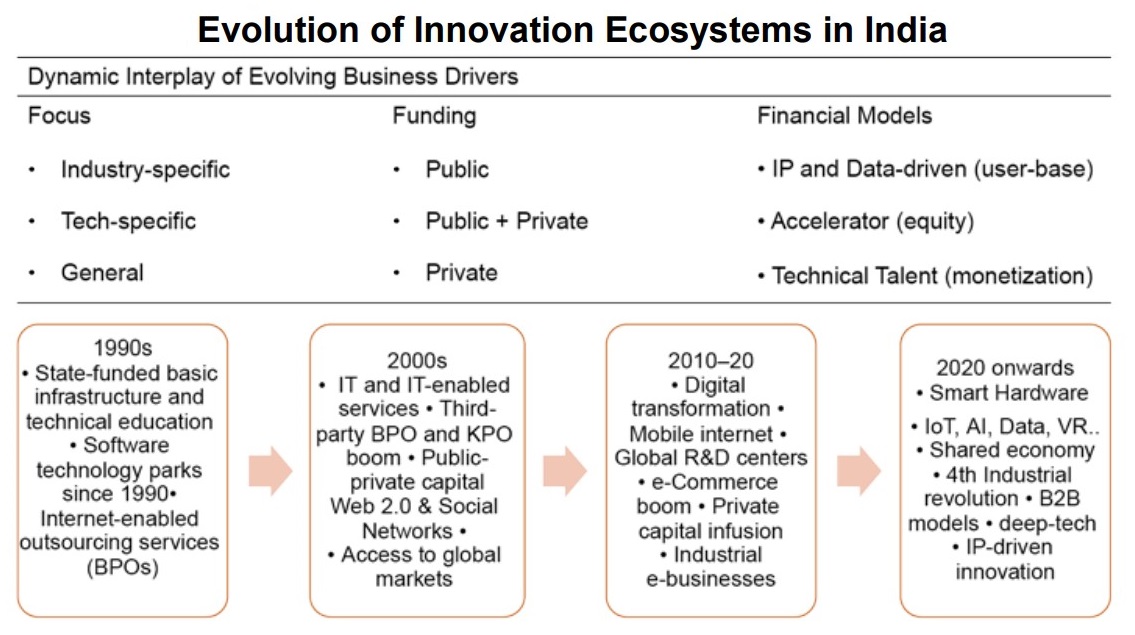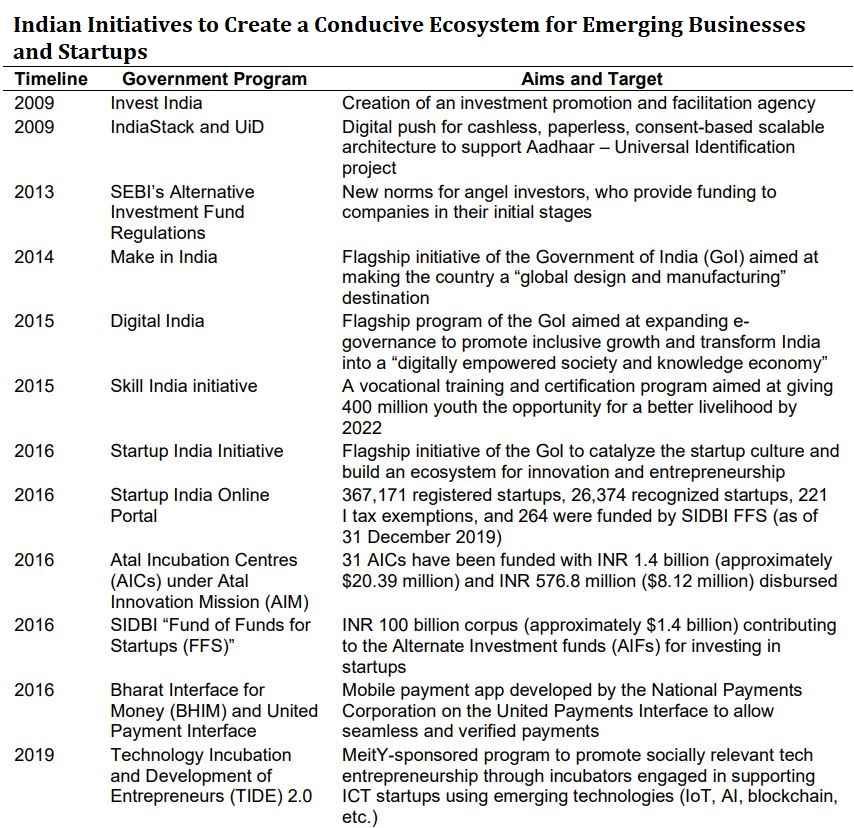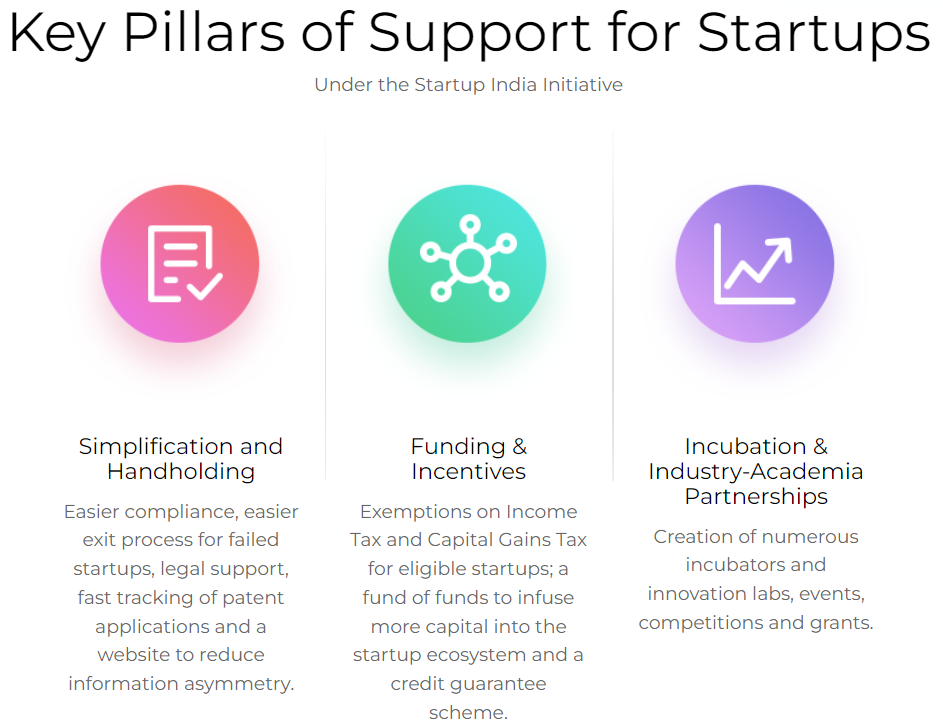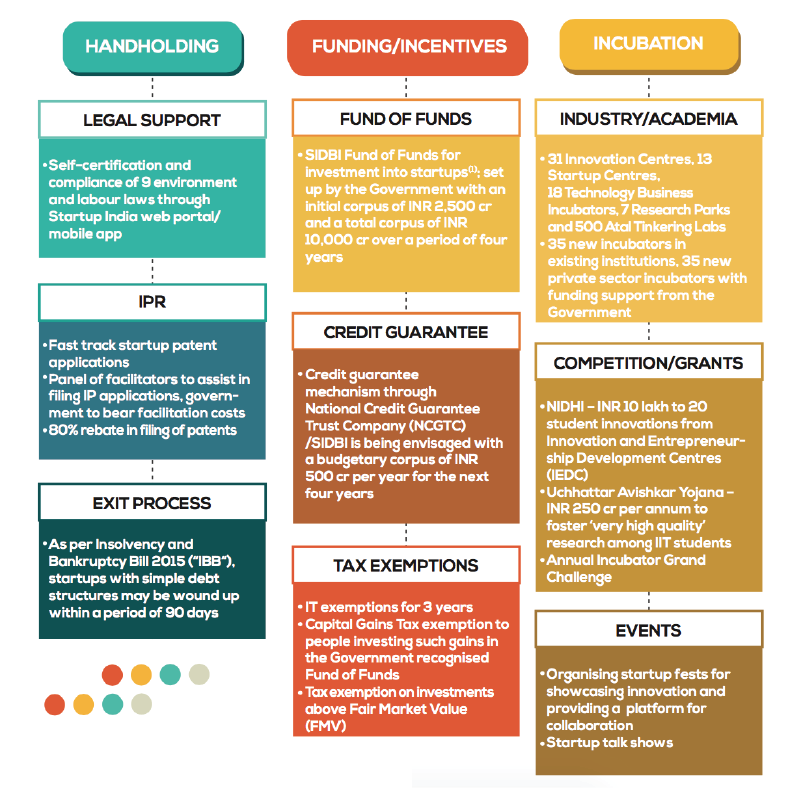India’s Startup ecosystem
2023 JAN 6
Mains >
Economic Development > Indian Economy and issues > Innovation and New technologies
IN NEWS:
- In a written reply to the Lok Sabha, Minister of State for Commerce and Industry has informed that the Department for Promotion of Industry and Internal Trade (DPIIT) has recognised 84,102 entities as startups as of November 30, 2022.
STARTUP ECOSYSTEM IN INDIA:
- The Indian startup ecosystem has evolved considerably over the last few decades.

- Today, India has the 3rd largest start-up ecosystem in the world after the US and China.
- The 84000 recognised startups are spread across 56 sectors, which includes 13% from IT services, 9% from health and life sciences, 7% from education, 5% from professional and commercial services, 5% from agriculture, and 5% food and beverage.
- In 2022, India managed to create 21 unicorns. The total number of unicorns in India reached 105 in mid-2022, but later came down to 84 owing to investor markdowns, acquisition and companies going public.
- The top five states in India with the most recognised startups are Maharashtra, Karnataka, Delhi, Uttar Pradesh and Gujarat.
|
Startups and associated terms:
- Minicorn startups are companies with valuations of more than USD 1 million and they are still on the rise to become a unicorn business.
- Soonicorn (“soon to be unicorn”) are startups with growth potential and the possibility of joining a unicorn club.
- Unicorn is a start-up is a privately held company with a valuation of USD 1 billion or more.
- Decacorn is a startup company with a current valuation of over USD 10 billion.
- Hectacorns are companies having a valuation of more than USD 100 billion. Eg: ByteDance and SpaceX.
- Zebra startups: Unlike unicorns, Zebra startups focus not only on profit goals, but also on sustainability aspects. In addition to economic goals, these startups pursue sustainable or social motives like climate change and human rights.
|
OPPORTUNITIES AND GROWTH DRIVERS:
- India’s demography:
- India has more than 50% of its population below the age of 25 and more than 65% below the age of 35. The youth is aspirational as well as more receptive to disruptive technologies. This creates a suitable ecosystem for innovation and startups.
- Rising consumption:
- As the Indian economy continues to grow, incomes and purchasing power are increasing steadily. One in two households is expected to be upper-middle income and high-income by 2030. This can boost consumption, making India a strong market.
- Comparative advantage:
- Human capital, well-established ICT sector and rapid strives to a digital and knowledge-based economy has enabled India to become a breeding ground for innovation and startups.
- Technological developments:
- Increased adoption of smartphones, UPI-based payments, cheaper internet connectivity etc. has reduced the cost of building digital products and improved access to consumer markets.
- Future trends present a great opportunity for startups to disrupt and innovate by using technologies such as blockchain, the Internet of Things (IoT), artificial intelligence (AI), and machine learning (ML), among others.
- Government Support:
- Through various measres, like the flagship “Startup India” initiative, government is promoting a strong ecosystem that is conducive for the growth of startup businesses.
- Besides these, reforms to promote ease of doing business in the country is actively being pursued. Eg: the codification of labour laws.
- Open innovation approach by large companies:
- Large companies realise that they cannot simply rely on internally generated knowledge and build everything themselves. Hence, they are increasingly reaching out to startups to increase their own innovativeness, through investments, strategic partnerships and acquisitions.
- Eg: In 2022, HCL Group acquired a majority stake in ed-tech platform GUVI.
- India’s diversity:
- Also, if startup solutions are successful in addressing the needs of diverse customers pan-India, they can likely find market uptake in other geographies such as Africa and Latin America.
- Changing perceptions towards entrepreneurship:
- The social acceptability of entrepreneurial careers is increasing in India. The success stories of entrepreneurs and unicorns are receiving much media attention today.
- Eg: Falguni Nayar received wide recognition when her e-commerce company ‘Nykaa’ became India's first woman-led Unicorn.
CHALLENGES:
- ‘Funding winter’:
- In 2022, funding has started to dry up due to global macro-economic factors like the Ukraine-Russia crisis and increase in interest rates by central banks.
- Hence, the Indian start-up ecosystem may succumb to a sharp correction in valuations, lay-offs, forced mergers and acquisitions, and a decrease in venture capitalist funding.
- Limited sources of finance:
- Methods used elsewhere in the world have not been tried or are not applicable in India. For instance, equity crowdfunding and Pre-order crowdfunding are widely prevalent in US and Japan, but not in India.
- Access to supporting infrastructure:
- Support mechanisms like incubators, science and technology parks, business development centers etc. remain largely restricted to tier I and tier II cities. Lack of access to such support mechanisms increases the risk of failure.
- Revenue generation:
- Despite increasing incomes, the Indian customer base continues to be price-sensitive towards products and services. Also, convincing them is difficult, especially if the startup develops innovative products and caters to new market segments. Hence, it is difficult for startups to generate a paying customer base.
- Acquiring and retaining human resource:
- Because they have little awareness of industry needs, fresh graduates are usually not readily employable from the beginning. Hence startups have to invest significant amount of time and cost to train new employees.
- Due to the inherent risk that the startup might fail, job seekers are hesitant to join a startup. Also, many of those who start working for startups, switch to established companies at the earliest.
- Lack of mentorship:
- Most of startups have brilliant ideas and/or products, but have little or no industry, business, market experience and branding strategy to get the products to the market.
- Low investments in research and development:
- The India Innovation Index 2021 has found that the overall spending on R&D by India stood at about 0.7% of GDP.
- India also struggles with a lack of innovation. Though patents filed in India have grown to 58,502 in 2020-21, it is still a fraction of the 5.30 lakh patents granted in China and 3.52 lakh patents granted in the USA.
- Information barrier:
- Most of the research activities in promising sectors like space and defence are centered around government organisations like ISRO and DRDO. Hence, nominal amount of information is available in the public, which hinders the development of indigenous start-ups.
- Regulatory hurdles:
- A complex unfriendly capital gains tax system is a major reason why many Indian start-ups have relocated their headquarters outside India
- Terms for startups to qualify for government benefits are too stringent and the application process cumbersome. This, coupled with multiplicity of laws and red tapism, results in delays in registration, acquiring licenses and permits, data storage and processing, contract management etc.
MAJOR GOVERNMENT INITIATIVES:

- Startup India:
- Launched in 2016, Startup India is a flagship initiative of the Government of India, intended to catalyse startup culture and build a strong and inclusive ecosystem for innovation and entrepreneurship in India.


- Mudra Yojana:
- Micro Units Development and Refinance Agency Ltd. (MUDRA) is an NBFC supporting development of micro enterprise sector in the country.
- MUDRA provides refinance support to Banks / MFIs for lending to micro units having loan requirement upto 10 lakh.
- Standup India Scheme:
- This scheme is one of the few government schemes for startups that encourage entrepreneurship among scheduled tribes (STs), scheduled castes (SCs), and women by offering financial help as loans.
- Software Technology Park (STP) Scheme:
- It is a 100 percent Export Oriented Scheme for the development and export of computer software, including export of professional services using communication links or physical media.
- Support for International Patent Protection in Electronics and & Information Technology (SIP-EIT):
- SIP-EIT is a scheme to provide financial support to MSMEs and Technology Startup units for international patent filing.
- Promoting Innovations in Individuals, Start-ups and MSMEs (PRISM)
- PRISM aims to provide support to institutions or organizations set up as Autonomous Organization under a specific statute or as a society registered under the Societies Registration Act, 1860 or Indian Trusts Act, 1882 leading to development of state-of-art new technology solutions aimed at helping MSME clusters.
- A Scheme for Promotion of Innovation, Rural Industries and Entrepreneurship (ASPIRE):
- ASPIRE was launched to set up a network of technology centres and to set up incubation centres to accelerate entrepreneurship and also to promote startups for innovation in agro industry.
- Innovations for Defence Excellence (iDEX):
- iDEX aims at creation of an ecosystem to foster innovation and technology development in Defence and Aerospace by engaging Industries including MSMEs, start-ups, individual innovators, R&D institutes & academia. iDEX will be funded and managed by ‘Defence Innovation Organisation’ (DIO).
- Defence Innovation Hubs (DIHs):
- iDEX framework under the Defence Ministry is envisaging setting up of independent Defence Innovation Hubs (DIHs) where innovators can get information about needs and feedback from the Armed Services directly and create solutions for India’s major defence problems.
- DIO has announced setting up of two DIHs in Coimbatore and Nashik
- Defence India Startup Challenge:
- Launched by Ministry of Defence in partnership with Atal Innovation Mission, it aims to support Startups/MSMEs/Innovators to create prototypes and to commercialize products or solutions in the area of National Defence and Security.
- Indian National Space Promotion and Authorisation Centre (IN-SPACe):
- It will be the nodal national entity to drive building of satellites, rockets, or launch services through Indian industry.
- As an oversight and regulatory body, it is responsible for devising mechanisms to offer sharing of technology, expertise, and facilities to promote non-government private entities (NGPEs).
- Start-up Village Entrepreneurship Program (SVEP):
- The Start-up Village Entrepreneurship Program is a sub-component of Deendayal Antyodaya Yojana – National Rural Livelihoods Mission (DAY-NRLM) of the Ministry of Rural Development.
- SVEP aims to support entrepreneurs in rural areas to set up local enterprises.
|
STARTUP INDIA INITIATIVE:
- Simplification and Handholding:
- Compliance Regime based on Self-Certification
- Startup India Hub: To create a single point of contact for the entire Startup ecosystem and enable knowledge exchange and access to funding.
- Rolling-out of Mobile App and Portal
- Legal support and fast-tracking patent examination at lower costs
- Relaxed Norms of Public Procurement for Startups
- Faster Exit for Startups: Startups may be wound up within a period of 90 days from making of an application for winding up
- Funding and incentives:
- Fund of Funds for startups
- Startup India Seed Fund Scheme
- Credit guarantee mechanism through National Credit Guarantee Trust Company (NCGTC)/ SIDBI
- Tax Exemption on Capital Gains
- Tax exemption to startups for 3 years
- Tax exemption on investments above fair market value
- Incubation & Industry-Academia Partnership:
- Organizing Startup Fests for showcasing innovation and providing a collaboration platform
- Launch of Atal Innovation Mission (AIM) with Self-Employment and Talent Utilization (SETU) Program
- Harnessing Private Sector Expertise for Incubator Setup
- Building innovation centres at national institutes
- Setting up of 7 new research parks
- Promoting startups in the biotechnology sector
- Annual incubator grand challenge
- Launching of innovation focused programs for students
- These programs are managed by a dedicated Startup India Team, which reports to the Department for Industrial Policy and Promotion (DPIIT).
|
WAY FORWARD:
Indian startups need to go beyond just emulating successful global ideas to the domestic context, and develop meta-level startups that address fundamental problems that can be scaled globally. For the same, the following measures can be adopted:
- Upgrading the R&D infrastructure and curriculums in education institutions to make students ready for the digital world
- Strengthen the domestic financing ecosystem by strengthening existing mechanisms like banks and encouraging new mechanisms like peer-to-peer lending.
- Reverse brain-drain: incentivize Indians to return to the country and establish startups.
- More incubation support, especially into industries such as media, education, healthcare, governance, sanitation, and alternate/clean energy.
- Data based risk assessment: More open data regarding startups for big data analysis can help identify successful characteristics of startup enterprises versus potential failure of startups and other challenges.
- Allow the listing of domestic companies overseas.
- Adopt global best practices:
- Japan has been collecting data for 20 years and used it to create a Credit Risk Database to analyse the characteristics of startups SMEs. A similar database could be constructed for India to promote financing for startups.
- Singapore set up International Enterprise, a government agency that was created to help its companies establish a global presence. A similar agency can be established in India to promote startups globally.
PRACTICE QUESTION:
Q. Startups can play an important role in giving fillip to economic growth in India. Discuss with special reference to Startup India initiative.



